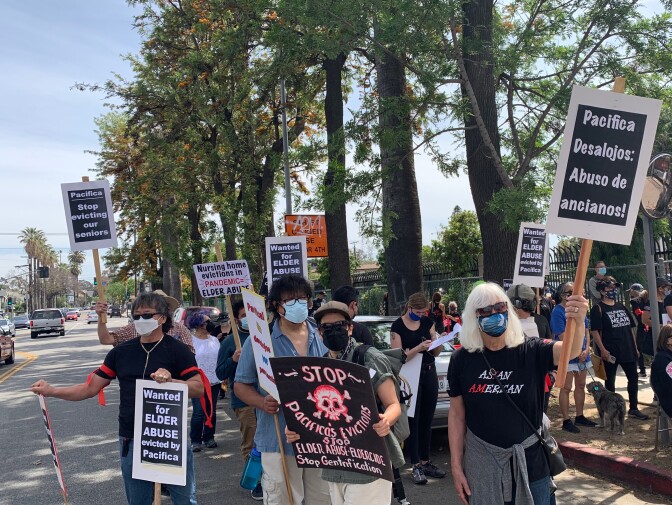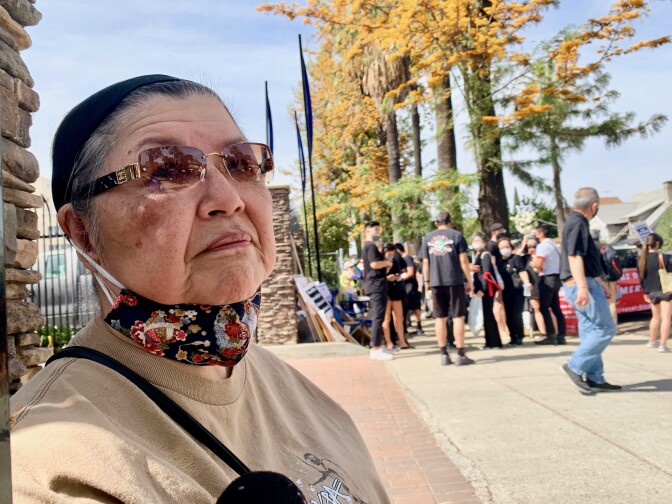This story is free to read because readers choose to support LAist. If you find value in independent local reporting, make a donation to power our newsroom today.
In Boyle Heights, Battle Over A Senior Home For Japanese Americans Is LA’s Latest Displacement Story

Gated off from a main drag in Boyle Heights is a tranquil senior living campus with a glittering koi pond and the transportive name of Sakura Gardens. It’s a nod to the Japanese heritage of its residents and a reminder of a large Japanese American community that thrived in Boyle Heights before World War II.
It’s also the latest ground zero in L.A.’s unending saga of displacement playing out in a neighborhood too familiar with the pressures of gentrification.
Plans by the owner of Sakura Gardens, Pacifica Companies, to close one of the facilities on the five-acre campus and possibly replace it with market-rate housing has drawn fierce backlash. A protest this month brought more than 120 demonstrators to the gates of the property.
“What do we want?” they chanted as cars honked in approval. “Justice! When do we want it? Now!”
Pacifica’s plans have drawn special outrage because many older Japanese Americans have previously been forced out of their homes. During World War II, more than 100,000 people were incarcerated just because of their Japanese heritage.
And then there was the closure announcement coming in the middle of a pandemic, and Pacifica’s suggestion that residents consider transferring to another one of its properties, Kei-Ai Los Angeles. The Lincoln Heights facility also provides Japanese-speaking staff, but has had one of the worst COVID-19 death rates among the state’s nursing homes.
Anxiety is building among the dozens of residents who would have to leave the targeted facility, which provides less intensive care than skilled nursing to mostly low-income beneficiaries of the state’s Medicaid program, Medi-Cal.
Ida Kawaski’s 94-year-old aunt, Setsuko Nishihara, appreciates the bilingual staff and Japanese meals and activities at Sakura Gardens, one of the few places in the country that offer culturally-sensitive care to issei like her. But now she’s worried about finding somewhere to rest her head at night.

“She said, ‘Just find a place for me that's free and I won't complain. I won't complain,” Kawasaki recalled her aunt saying in Japanese. “It breaks my heart, you know, for her to talk like that.”
There is no set date for closure yet. Pacifica, a developer with an international portfolio that includes hotels, housing complexes and shopping centers, still needs state approval to shut down the facility.
Its initial plan was rejected by the California Department of Public Health for not providing a reason why it was closing, and failing to explain how it was going to mitigate COVID-19 infection risks during patient transfers.
A revised plan is now under review by the state.
Pacifica representatives declined interviews, but in e-mailed and online statements have said that the facility has been losing about $100,000 a month because medical reimbursement by the state is too low to cover rising expenses, including wages.
The company said that it could no longer absorb the operating losses and had hoped the Japanese American community would step in:
“Pacifica Senior Living reached out to community groups to discuss helping cover the losses, but were unsuccessful as not one group or person stepped forward to assist with the Sakura Gardens Intermediate Care Facility operating losses.”
The company’s response doesn’t sit well with family members of residents.
“I'm pissed because they're a multi-million dollar corporation,” Kawasaki said. “I don't see why they can't just let this one little place stay — out of charity.”
The San Diego-based Pacifica plans to continue operating an assisted living community and a dementia care unit on site, both of which generate higher medical reimbursement rates.
The company added the dementia care unit after buying the senior housing complex from the non-profit Keiro Senior HealthCare five years ago.
Keiro had been established decades ago to provide a safety net for aging Japanese Americans. When Keiro proposed selling to the for-profit developer, the community mobilized against the plan, coming out by the hundreds to testify in opposition.

Then-Attorney General Kamala Harris approved the sale on the condition that Pacifica maintain services for five years. Those conditions expired in February. Months earlier, Pacifica floated plans for a housing complex to be built in place of the Intermediate Care Facility.
Sojin Kim, a Smithsonian curator who has spent years researching Boyle Heights and East L.A., said the pain of losing the facility hits on different levels. It’s happening in Boyle Heights, where Japanese Americans lived alongside Jews and Mexican Americans because racist housing covenants excluded them from other parts of L.A.
Now developers and real estate agents tout panoramic views of downtown.
“It’s a place that was once devalued, where people once were marginalized, and now it has a lot of economic value and potential,” Kim said.
Also, within the Japanese American community, the facility’s closure tears at a parachute of care for its most vulnerable members.
“It’s not just something for our elders, but for the younger people who have to take care of our aging elders,” said Traci Imamura, who co-chairs the group Save Our Seniors. “These facilities made up the old community that took care of each other.”
As the state considers approving Pacifica’s plans, U.S. Rep. Maxine Waters and L.A. County Supervisor Hilda Solis have lent their political firepower to the fight against closure.
Meanwhile, a bill proposed by Assemblymembers Al Muratsuchi and Miguel Santiago would bar senior care facilities such as Pacifica from moving residents out during the pandemic.
Japanese American activists continue to hold protests, leading a multi-ethnic, multi-racial group of supporters.
The last protest on May 1 included several Black clergy. During his turn at the microphone, Pastor Oliver Buie said it was important for him to reciprocate the support the Black community has received from Japanese Americans.
“I'm here today because when it was time, where they said I couldn't live in particular communities and neighborhoods, those seniors in there stood up and made a way for me,” Bouie said to applause.
Ken Nakayama of Tustin also spoke on behalf of his 93-year-old mother, Tomiko.

An immigrant who came from Japan in the 1960s, the part-time seamstress often visited close friends in Boyle Heights and took her son to the dojo at Cesar Chavez and Evergreen, where her husband also taught judo.
Decades later, after her husband died, Nakayama returned to Boyle Heights, this time as a resident at the Intermediate Care Facility where she knew some of the residents from her younger days.
Her son, who’s 67, said she is relatively healthy, though her short-term memory is worsening. To him, that’s a bit of a blessing.
“That way,” he said, “she doesn't have to worry about what her fate is going to be.”
He holds out hope that the state bill will pass and delay his mother's move, but that wouldn't stop the facility from closing.








